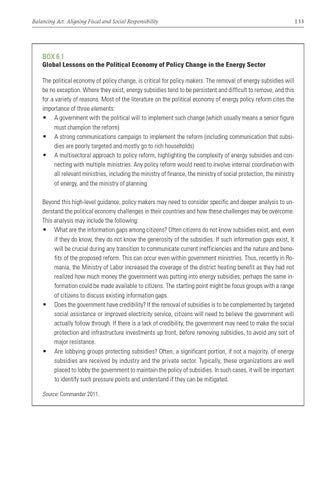Balancing Act: Aligning Fiscal and Social Responsibility
BOX 6.1 Global Lessons on the Political Economy of Policy Change in the Energy Sector The political economy of policy change, is critical for policy makers. The removal of energy subsidies will be no exception. Where they exist, energy subsidies tend to be persistent and difficult to remove, and this for a variety of reasons. Most of the literature on the political economy of energy policy reform cites the importance of three elements: • A government with the political will to implement such change (which usually means a senior figure must champion the reform) • A strong communications campaign to implement the reform (including communication that subsidies are poorly targeted and mostly go to rich households) • A multisectoral approach to policy reform, highlighting the complexity of energy subsidies and connecting with multiple ministries. Any policy reform would need to involve internal coordination with all relevant ministries, including the ministry of finance, the ministry of social protection, the ministry of energy, and the ministry of planning Beyond this high-level guidance, policy makers may need to consider specific and deeper analysis to understand the political economy challenges in their countries and how these challenges may be overcome. This analysis may include the following: • What are the information gaps among citizens? Often citizens do not know subsidies exist, and, even if they do know, they do not know the generosity of the subsidies. If such information gaps exist, it will be crucial during any transition to communicate current inefficiencies and the nature and benefits of the proposed reform. This can occur even within government ministries. Thus, recently in Romania, the Ministry of Labor increased the coverage of the district heating benefit as they had not realized how much money the government was putting into energy subsidies; perhaps the same information could be made available to citizens. The starting point might be focus groups with a range of citizens to discuss existing information gaps. • Does the government have credibility? If the removal of subsidies is to be complemented by targeted social assistance or improved electricity service, citizens will need to believe the government will actually follow through. If there is a lack of credibility, the government may need to make the social protection and infrastructure investments up front, before removing subsidies, to avoid any sort of major resistance. • Are lobbying groups protecting subsidies? Often, a significant portion, if not a majority, of energy subsidies are received by industry and the private sector. Typically, these organizations are well placed to lobby the government to maintain the policy of subsidies. In such cases, it will be important to identify such pressure points and understand if they can be mitigated. Source: Commander 2011.
133
